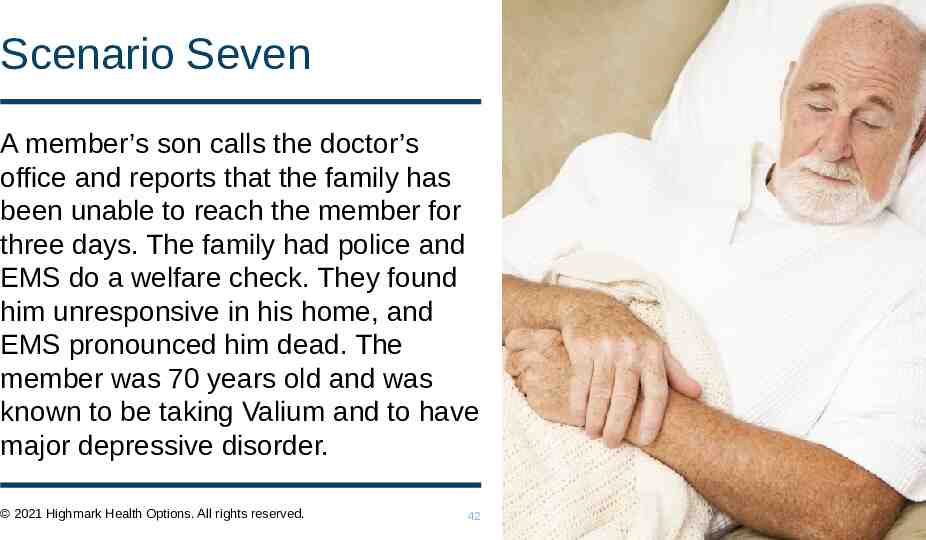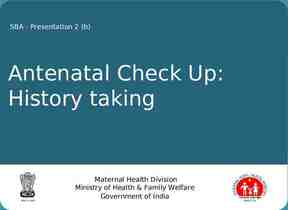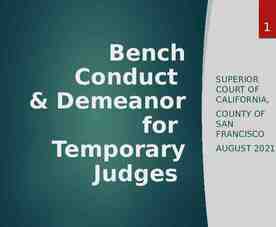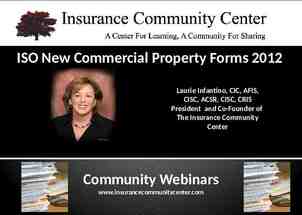2021 Critical Incidents in Elder and Vulnerable Adults 2021
46 Slides2.54 MB

2021 Critical Incidents in Elder and Vulnerable Adults 2021

Goals 1. Critical Incident Statistics 2. Critical Incidents Defined with Signs and Symptoms 3. Notification 4. Critical Incident Scenarios 2021 Highmark Health Options. All rights reserved. 2

1 Statistics

2020 Critical Incidents Q1 2020 Q2 2020 Q3 2020 Q4 2020 Totals Suspected physical, mental, sexual abuse, neglect/exploitation 37 46 43 41 167 Suspected physical abuse 20 25 28 18 91 Suspected mental abuse 4 1 3 4 12 Suspected sexual abuse 4 9 3 4 20 Suspected neglect 9 11 9 15 44 Suspected exploitation 0 0 0 0 0 Inappropriate/unprofessional conduct by a provider involving a member 1 0 2 5 8 Serious injury sustained by a member 3 3 5 8 19 Falls with injury 2 2 2 2 8 Overdose 0 0 0 0 0 Burn 0 0 0 3 3 Other serious injury 1 1 3 3 8 2021 Highmark Health Options. All rights reserved. 4

Suspected theft or financial exploitation of a member 4 4 5 4 17 Theft 3 4 3 3 13 Financial exploitation 1 0 2 1 4 Unexpected death of a member 11 22 9 8 50 COVID deaths 0 1 0 0 1 Overdose 2 10 2 2 16 Suicide 0 0 0 0 0 MI 0 1 0 0 1 Stroke 0 0 0 0 0 TBI/Trauma 1 0 4 1 6 Unknown 8 10 3 5 26 Other 1 1 5 10 17 Total Critical Incidents per Quarter 57 76 69 76 278 2021 Highmark Health Options. All rights reserved. 5

2021 Highmark Health Options. All rights reserved. 6

2 Notification

Highmark Health Options will report to the state: If any staff or the staff of a subcontractor has reason to believe that a member has been abused, mistreated, neglected, or financially exploited, or has knowledge of the occurrence of other critical incidents. 2021 Highmark Health Options. All rights reserved. 8

Who can report a Critical Incident? Anyone can report External Reporting: Members, family members, providers, practitioners, office staff, state or federal agencies, and FWA Internal Reporting: Care Management, Member Services, Quality Improvement 2021 Highmark Health Options. All rights reserved. 9

Identification and Notification When a CI is identified, Provider or staff: Should immediately report the incident the appropriate state agency Should report the incident to Highmark Health Options through Member Services: 1-844-325-6251 2021 Highmark Health Options. All rights reserved. 10

Identification and Notification Report CIs the same business day of the CI to: Adult Protective Services (APS) 1-302-424-7310 For suspected abuse, neglect, disruptive behavior, or exploitation Division of Health Care Quality (DHCQ) 1-877-453-0012 Delaware Health and Social Services (DHSS) Long-Term Care Office of the State Ombudsman (OSO) 1-800-223-9074 For residents in long-term care facilities, who have a complaint about their rights Office of Health Facilities and Licensing and Certification (OHFLC) 1-302-292-3930 or 1-800-942-7373 For members in a long-term care facility For child members in a pediatric nursing facility Acute care and outpatient healthcare facilities and agencies throughout Delaware The Division of Family Services (DFS) 1-800-292-9582 For children living in the community Note: This phone number is also the 24-hour Child Abuse and Neglect Reporting Hotline. 2021 Highmark Health Options. All rights reserved. 11

3 Critical Incidents: Definitions, Signs, and Symptoms

Critical Incidents Defined CIs are defined by DMMA. They include: Unexpected death of a member Suspected physical, mental, or sexual mistreatment, abuse, and neglect of a member Suspected theft or financial exploitation of a member Severe injury sustained by a member Inappropriate or unprofessional conduct by a provider involving a member 2021 Highmark Health Options. All rights reserved. 13

Unexpected Death of a Member Any death of a member that was not expected: A member found dead in their home A member who becomes suddenly ill or injured and dies in the emergency department or hospital within a couple of days 2021 Highmark Health Options. All rights reserved. 14

Expected, Impending Death of a Member Expected impending death involves: A member who has a long illness or chronic condition that requires hospital or hospice care A member who has been hospitalized for a condition and develops complications related to that condition 2021 Highmark Health Options. All rights reserved. 15

Suspected Physical Abuse Non-accidental infliction of pain or injury: Broken eyeglasses Force feeding Repeated, unexplained, or improbable injuries Restraint trauma (rope burns, welts, hand-shaped bruises) Signs of physical trauma (scratches, burns, lacerations, or bruises) 2021 Highmark Health Options. All rights reserved. 16

Indicators of Suspected Physical Abuse Adult Caregiver Acts agitated or violent Displays signs of trauma, like rocking back and forth Has trouble sleeping Seems depressed or confused Gives different explanations for the same injury History of doctor or ED shopping Offers an inadequate or inappropriate explanation for the injury Repeated time lag between injury and medical attention Seems unconcerned about adult 2021 Highmark Health Options. All rights reserved. 17

Suspected Emotional Abuse Infliction of mental anguish: Caregiver intentionally obstructs member’s religious observances, dietary restrictions, or holiday participation Humiliating or degrading statements Intimidation through verbal aggression or threats Overmedication or sedation Social isolation Terrorizing or menacing the person Threats of institutionalization 2021 Highmark Health Options. All rights reserved. 18

Indicators of Suspected Emotional Abuse Adult Caregiver Behavior that mimics dementia such as rocking, Caregiver’s refusal to allow you to see the elder alone sucking, or mumbling to themselves. Threatening, belittling, or controlling behavior Increased fear or anxiety. Unexplained withdrawal from friends or family Unusual changes in behavior or sleep Sudden change in alertness or unusual depression Withdrawal from normal activities Member may express feelings of depression, hopelessness, or helplessness, or suicidal ideations 2021 Highmark Health Options. All rights reserved. 19

Suspected Neglect Intentional or unintentional refusal or failure of designated caregiver to meet needs required for an older or vulnerable adult's well-being. Failure to provide adequate: Clothing – inappropriate Food Hygiene Shelter – unsafe or unsanitary living conditions Social stimulation/interaction Untreated bedsores or health problems 2021 Highmark Health Options. All rights reserved. 20

Indicators of Suspected Neglect Adult Abandonment Begging food from neighbors Constant fatigue, falling asleep during day Consistent hunger, poor hygiene, inappropriate dress Consistent lack of supervision for long periods, or overnight States there is no caretaker Unattended physical problems or medical or dental needs 2021 Highmark Health Options. All rights reserved. 21

Suspected Sexual Abuse in an Adult Nonconsensual genital contact or unwanted sexual talk. Inappropriate touching, fondling of a nonconsenting competent or incompetent adult Suggestive talk The member is forced, tricked, or threatened by a person into sexual activity 2021 Highmark Health Options. All rights reserved. 22

Indicators of Suspected Sexual Abuse Adult Bruises or bleeding in genital, vaginal, or anal areas Individual’s report of being sexually assaulted or raped Member may refuse personal care Member shows fear when certain individuals are present Sexually transmitted disease Torn, stained, or bloody underclothing 2021 Highmark Health Options. All rights reserved. 23

Theft Theft Money, medication, credit cards, or other items are missing Personal belongings are missing 2021 Highmark Health Options. All rights reserved. 24

Financial Exploitation Financial Exploitation “The illegal or improper use, control over, or withholding of the property, income, resources, or trust funds of the elderly person or the vulnerable adult by any person or entity for any person’s or entity’s profit or advantage.” Del. Code, Title 31, Chapter 39 section 3902. 2021 Highmark Health Options. All rights reserved. 25

Indicators of Financial Exploitation Abrupt changes in will or other financial documents Adding additional names to bank cards Bills unpaid despite the money being available to pay them Forging a signature on financial transactions or titles Individual's report of exploitation Providing services that are not necessary Sudden: – Appearance of previously uninvolved relatives claiming rights to a vulnerable adult’s possessions – Changes in bank account or banking practices Unauthorized withdrawal of funds using ATM card Unexplained: – Disappearances of funds or valuable possessions – Sudden transfer of assets to a family member or someone outside the family 2021 Highmark Health Options. All rights reserved. 26

Severe Injury Any serious injury occurring while the member is receiving services from a paid provider or caregiver that has the potential to cause further debilitation of the member. Concussions Fractures Lacerations Second- and third-degree burns 2021 Highmark Health Options. All rights reserved. 27

Elder Abuse Suspicion Index (EASI) Within the past 12 months: 1. Have you relied on people for any of the following: bathing, dressing, shopping, banking, or meals? 2. Has anyone prevented you from getting food, clothes, medication, glasses, hearing aids, or medical care, or from being with people you wanted to be with? 3. Have you been upset because someone talked to you in a way that made you feel shamed or threatened? 4. Has anyone tried to force you to sign papers or to use your money against your will? 5. Has anyone made you afraid, touched you in ways that you did not want, or hurt you physically? 6. Physician: Elder abuse may be associated with findings such as poor eye contact, withdrawn nature, malnourishment, hygiene issues, cuts, bruises, inappropriate clothing, or medication compliance issues. Did you notice any of these today or in the past 12 months? 2021 Highmark Health Options. All rights reserved. 28

4 Scenarios 29

Scenario One A 70-year-old female LTSS member slips and falls on ice-covered steps when visiting a friend across the street. The member fractures her hip. The member calls Member Services soon after she returns home from the hospital. 2021 Highmark Health Options. All rights reserved. 30

What should you do? Provider: Recognizes that this is not a critical incident because member was: – Not receiving care from a provider at the time – Visiting a friend Contacts the LTSS Case Manager through member services at 1-844-325-6251 LTSS Case Management: Follows up with the member to ensure appropriate services and resources are in place 2021 Highmark Health Options. All rights reserved. 31

Scenario Two An LTSS member’s daughter is upset and calls the PCP. She says she overheard a conversation between her elderly mother and an aide in the facility where her mother lives. Her mother had repeatedly asked to use the bathroom. The aide snapped, “I don’t have time for your nonsense right now! Just wait.” The daughter asks what she should do. 2021 Highmark Health Options. All rights reserved. 32

What should you do? The provider: Recognizes that: – This is a critical incident: Inappropriate or unprofessional conduct by a provider involving a member – The daughter’s dissatisfaction is with the aide’s service – Notifies Division of Health Care Quality (DHCQ) at 1-877-453-0012 Gives the daughter the Member Service’s phone number: 1-844-325-6251 2021 Highmark Health Options. All rights reserved. 33

Scenario Three A PCP conducts a follow-up exam for a 65-year-old member with intellectual disabilities and Down Syndrome, who was removed from a group home by his sister. In speaking with the member’s sister, the provider identifies the following concerns: The sister does not have knowledge of the member’s medications, whether the member had adequate medications, or when the medications were last filled The sister does not seem to know the member’s medical appointment dates The sister seems to be a poor historian regarding the member and his care. 2021 Highmark Health Options. All rights reserved. 34

What should you do? The PCP: Recognizes that the reported situation is a CI: Suspected neglect of a member Notifies: – APS at 1-302-424-7310 – Highmark Health Options at 1-844-325-6251 Follows up with member to ensure adequate services are being provided and that the member is safe 2021 Highmark Health Options. All rights reserved. 35

Scenario Four An LTSS member calls the and reports she is upset about the care she received from her home health care agency. She states that the home health care nurse gave her the wrong pills. 2021 Highmark Health Options. All rights reserved. 36

What should you do? The Primary Care Provider: Recognizes that this is a critical incident: A medication error involving a member Reports the CI to: – OHFLC at 1-302-292-3930 or 1-800-942-7373 – Calls Highmark Health Options at 1-844-325-6251 2021 Highmark Health Options. All rights reserved. 37

Scenario Five A wheelchair-bound man with multiple sclerosis falls from his wheelchair while at the doctor’s office. He is helped back into his chair and the office visit continues. Afterward, he goes to the emergency department to be evaluated because his hip is sore. Evaluation and X-rays are negative. He reports this to doctor’s office. 2021 Highmark Health Options. All rights reserved. 38

What should you do? The staff: Recognize that this is not a critical incident – The fall occurred when the member was not under the care of a paid caregiver – The member had no injuries Educate the member on safety precautions to take while in his wheelchair (e.g., use a seatbelt, not lean too far forward) 2021 Highmark Health Options. All rights reserved. 39

Scenario Six A member complains to her primary care provider that 200 went missing from an envelope in her bureau drawer and that her aide has charged his personal items to her debit card. 2021 Highmark Health Options. All rights reserved. 40

What should you do? The provider: Recognizes that this is a critical incident: Suspected theft Provides the member with information and assistance to notify law enforcement. Reports the CI to: – OHFLC at 1-302-292-3930 or 1-800-942-7373 – Highmark Health Options at 1-844-325-6251 2021 Highmark Health Options. All rights reserved. 41

Scenario Seven A member’s son calls the doctor’s office and reports that the family has been unable to reach the member for three days. The family had police and EMS do a welfare check. They found him unresponsive in his home, and EMS pronounced him dead. The member was 70 years old and was known to be taking Valium and to have major depressive disorder. 2021 Highmark Health Options. All rights reserved. 42

What should you do? The office: Recognizes that this is a critical incident: Unexpected death of a member Calls Highmark Health Options at 1-844-325-6251 2021 Highmark Health Options. All rights reserved. 43

Scenario Eight When a Primary Care Provider is doing a check up on a member she says she burned her hand while handling a sparkler at her family’s July 4th party. 2021 Highmark Health Options. All rights reserved. 44

What should you do? The Primary Care Provider: Recognizes that this is not a critical incident Discusses fire safety and burn care with the member Mentions that sparklers are illegal in Delaware because they are so dangerous 2021 Highmark Health Options. All rights reserved. 45

Putting our members and their safety first is a responsibility we all share. We must ensure that critical incidents are: Identified Reported Managed appropriately This is a vital step in our mission. Thank you for participating today! 2021 Highmark Health Options. All rights reserved. 46






